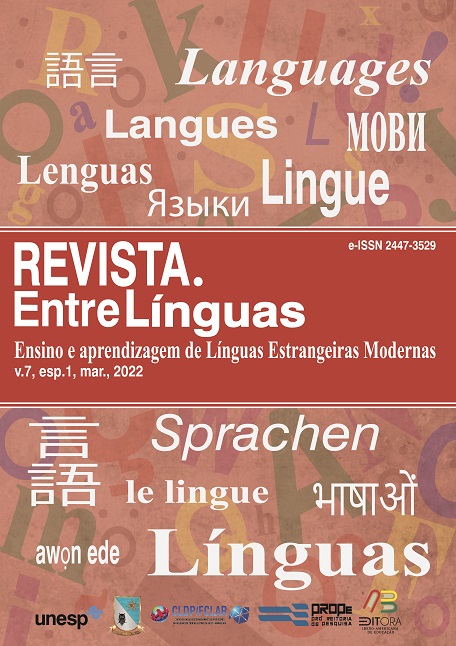O status do ensino de língua estrangeira e música em um sistema universitário não linguístico
DOI:
https://doi.org/10.29051/el.v8iesp.1.16917Palavras-chave:
Língua Estrangeira, Matérias Principais e Suplementares, Voz principal, AcompanhamentoResumo
Este artigo tem como objetivo fornecer embasamento teórico do status de “Língua Estrangeira” como disciplina acadêmica no leque de outras disciplinas estudadas em uma universidade não linguística. A pesquisa mostra que as altas exigências são impostas a disciplinas complementares, como acompanhamento e língua estrangeira, que têm seu status individual, além de características semânticas e dinâmicas. A interação benéfica do solista e do acompanhante desempenha um papel mutuamente enriquecedor, dando uma visão da peça musical tanto para o músico quanto para o público. O componente humanitário introduzido no processo educativo através dos estudos linguísticos complementa e enriquece todo o processo e confere-lhe plenitude semântica. A análise dos paralelos dialéticos (sujeito principal – sujeito suplementar, voz principal – acompanhamento) provou que cada um de seus componentes tem seu próprio status.
Downloads
Referências
ABRUDAN, C. S.; STURZA, A.; SUPURAN, A. Raising Engineering Students’ Awareness as Regards the Importance of Improving their Proficiency in English. Journal of Teaching English for Specific and Academic Purposes, v. 9, n. 1, p. 99-108, 2021. Available in: http://espeap.junis.ni.ac.rs/index.php/espeap/article/view/1095. Access in: 05 Oct. 2020.
BAZHANOV, N. S. Agogic and tempo in sounding of the musical piece. Bulletin of Tomsk State University Journal of Cultural Studies and Art History, v. 36, p. 130–139, 2019. Available in: https://cyberleninka.ru/article/n/agogika-i-temp-v-zvuchanii-muzykalnogo-proizvedeniya. Access in: 12 Mar. 2021.
GANYUSHKINA, E. V.; MUKHINA, T. G. Literature as a means of professional and ethical culture development with medical students. In: PROCEEDINGS OF INTERNATIONAL APPLIED RESEARCH CONFERENCE, 4., 2021, Nizhny Novgorod. Annals[…]. Lobachevsky State University of Nizhny Novgorod, Nizhny Novgorod, Russia, 2021.
GLINKA, M. I. Literary Heritage. Leningrad, 1952.
HANNA, M.; FINS, J. J. Power and communication: Why simulation training ought to be complemented by experiential and humanist learning. Acad. Med., v. 81, n. 3, p. 265–270, 2006. Available in: https://pubmed.ncbi.nlm.nih.gov/16501273/. Access in: 12 Feb. 2021.
HARMER, J. The Practice of English Language Teaching. London: Longman, 1991.
IVANOV, S. S. Forming listening and verbal and motor functions of the speaker in a foreign language environment. In: PROCEEDINGS OF INTERNATIONAL APPLIED RESEARCH CONFERENCE, 2018, Nizhny Novgorod. Annals […]. Lobachevsky State University of, Nizhny Novgorod, 2018.
KANNO, Y.; STUART, C. Learning to Become a Second Language Teacher: Identities-in-Practice. The Modern Language Journal, v. 95, n. 2, p. 236-252, 2011. Available in: https://onlinelibrary.wiley.com/doi/10.1111/j.1540-4781.2011.01178.x. Access in: 12 Apr. 2021.
KHUSNULINA, R. R.; ISLAMOVA, G. G. Enriching role of a foreign language in a non-linguistic university. Teaching And Research Activities, p. 276-281, 2011. Available in: https://m.cyberleninka.ru/article/n/razvivayuschaya-rol-inostrannogo-yazyka-v-neyazykovom-vuze. Access in: 04 Mar. 2021.
KRYLOV, I. A. Quartet. St. Petersburg, 1811.
KUZNETSOVA, T. G. Foreign language role in preparing future specialists in a non-linguistic university. Saratov: Saratov National Research State University. Available in: https://www.sgu.ru/sites/default/files/textdocsfiles/2014/03/13/kuznecova_t.g.pdf. Access in: 10 Mar. 2021.
LONGMAN DICTIONARY OF CONTEMPORARY ENGLISH. London: Pearson Education limited. 2001.
LUBLINSKIY, A. A. Theory and practice of accompaniment. Leningrad: Muzyka, 1972.
MAZUR, A. E. The Art of Appreciating Accompaniment. Musical U, EUA. Available in: https://www.musical-u.com/learn/the-art-of-appreciating-accompaniment/. Access in: 12 June 2021.
PENNINGTON, M. C. Teacher Identity in TESOL: A Frames Perspective. In: CHEUNG, Y. L.; SAID, S. B.; PARK, K. (eds.). Advances and Current Trends in Language Teacher Identity Research. Abingdon: Routledge, 2015.
RAJGURU, S. P. Establishing English for specific purposes position in ELT Context. Journal of Teaching English for Specific and Academic Purposes, v. 5, n. 3, p. 515-519, 2017. https://doi.org/10.22190/JTESAP1703515R
REBENKO, M. Modelling ESP Teacher Identity in Ukranian Tertiary Education. Journal of Teaching English for Specific and Academic Purposes, v. 8, n. 3, p. 201-213, 2020. Available in: http://espeap.junis.ni.ac.rs/index.php/espeap/article/view/1061. Access in: 20 Mar. 2021.
RIMAN, G. Musical Dictionary. Moscow: Yurgenson, 1901.
SUPRUNOV, S. E. Studying foreign languages in a non-linguistic university. Samara: Vector, 2017.
SVIDERSKY, V. I. Structures and Elements Dialectics. Moscow, 1962.
TAO, J. T., GAO, X. A. Identity Constructions of ESP Teachers in a Chinese University. English for Specific Purposes, v. 49, p. 1-13, 2018. Available in: https://www.sciencedirect.com/science/article/abs/pii/S0889490617302685. Access in: 2 June 2021.
TER-MINASOVA, S. G. Language and intercultural competence. Мoscow: Slovo, 2000.
VETLUZHSKAYA, M. V. et al. Characteristics of Emotional Intelligence and Empathic Abilities in Medical Students. Integration of Education, v. 23, n. 3, p. 404-422, 2019. Available in: https://www.researchgate.net/publication/336142771_Characteristics_of_Emotional_Intelligence_and_Empathic_Abilities_in_Medical_Students. Access in: 14 Apr. 2021.
VOVSI-TILL'E, L. A. Modern goals of teaching foreign languages in a non-linguistic university. Pedagogical Journal, v. 8, n. 3A, p. 132-137, 2018. Available in: http://publishing-vak.ru/file/archive-pedagogy-2018-3/18-vovsi-tille.pdf. Access in: 13 June 2021.
WU, H.; BADGER, R. G. In a Strange and Uncharted Land: ESP teachers’ strategies for dealing with unpredicted problems in subject knowledge during class. English for Specific Purposes, v. 28, n. 1, p. 19-32, 2009. Available in: https://www.sciencedirect.com/science/article/abs/pii/S0889490608000483. Access in: 15 June 2021.
YAZAN, B.; LINDAHL, K. Language Teacher Identity in TESOL: Teacher Education and Practice as Identity Work. New York: Routledge, 2020.
Downloads
Publicado
Como Citar
Edição
Seção
Licença

Este trabalho está licenciado sob uma licença Creative Commons Attribution-NonCommercial-ShareAlike 4.0 International License.
Os manuscritos aceitos e publicados são de propriedade da Revista EntreLínguas. Os artigos publicados e as referências citadas na Revista EntreLínguas são de inteira responsabilidade de seus autores.
Transferência de direitos autorais – autorização para publicação
Caso o artigo submetido seja aprovado para publicação, já fica acordado que o(s) autor(es) autoriza(m) a UNESP a reproduzi-lo e publicá-lo na EntreLínguas, entendendo-se os termos “reprodução” e “publicação” conforme definição respectivamente dos incisos VI e I do artigo 5° da Lei 9610/98. O artigo poderá ser acessado pela rede mundial de computadores (Internet), sendo permitidas, a título gratuito, a consulta e a reprodução de exemplar do artigo para uso próprio de quem a consulta, desde que haja a citação ao texto consultado. Essa autorização de publicação 328 EntreLínguas, Araraquara, v. 1, n .2, p. 323-328, jul./dez. 2015 não tem limitação de tempo, ficando a UNESP responsável pela manutenção da identificação do(s) autor(es) do artigo. Os artigos publicados e as referências citadas na Revista EntreLínguas são de inteira responsabilidade de seus autores.











